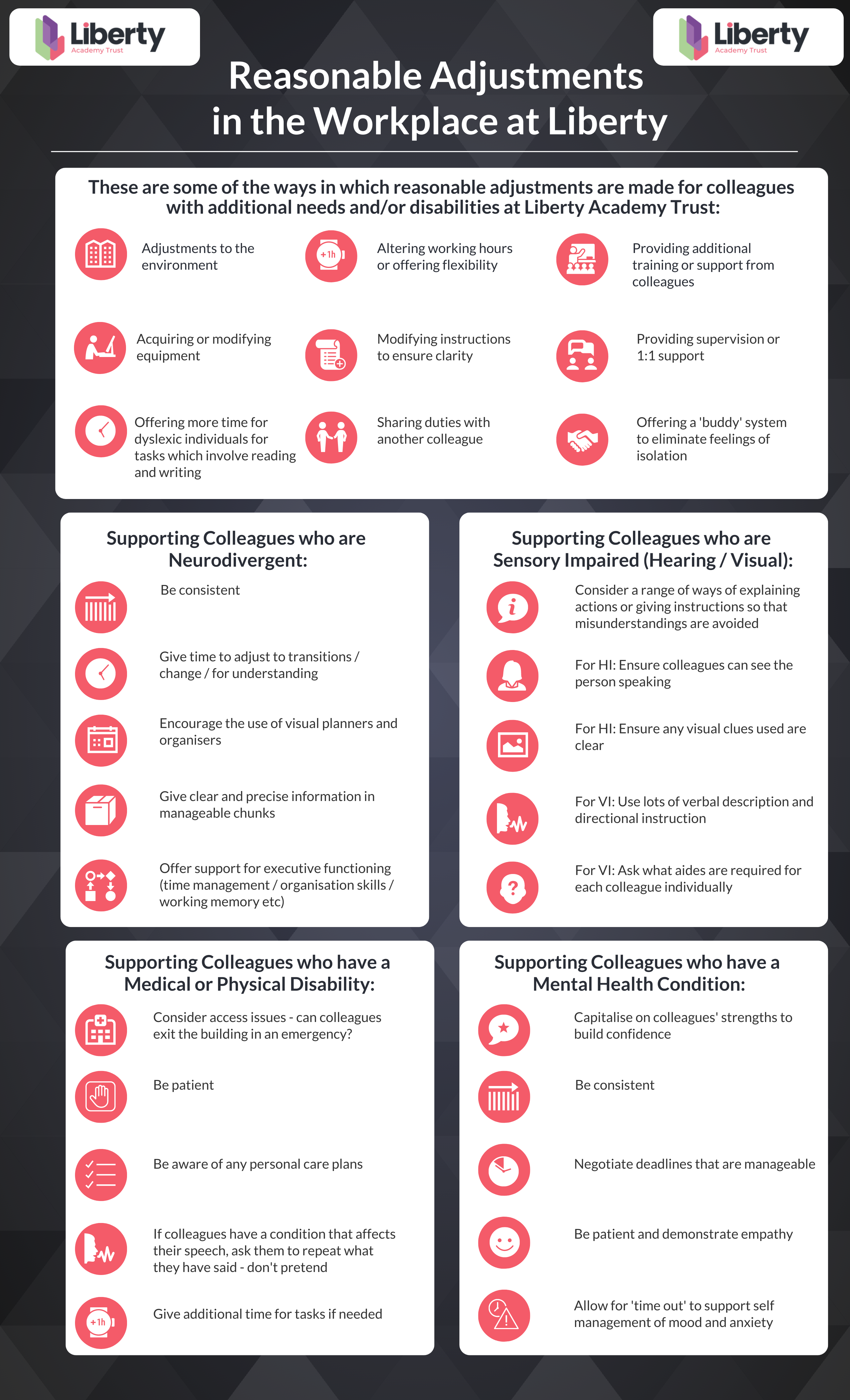Disability Confident Leader

Liberty Academy Trust is proud to be a Disability Confident Leader.
We achieved Disability Confident Leader status in December 2024 after an external validation process and as a Disability Confident Leader we are:
- challenging attitudes towards disability
- increasing understanding of disability
- removing barriers to disabled people and those with long-term health conditions
- ensuring that disabled people have the opportunities to fulfil their potential and realise their aspirations.
Read the statement from our CEO, Dr Nicola Crossley, on how we demonstrate our commitment to this below:-
"It is often thought that as a group of special schools, we already do enough to support disabilities across the workforce and as a result, it can be all too easy to become complacent. That was the key reason for us starting on the Disability Confident journey in Spring 2023 following our inception as Liberty in December 2022 – because it is not enough to simply assume.
Our approach to Disability Confident accreditation has been underpinned by our EDI Strategy and the development of an EDI Partnership Board, whose members are all colleagues from marginalised groups; it is important that our work is directed by those who it impacts personally.
Many leaders across the Trust have personal stories and experiences that illustrate why evidencing ourselves as Disability Confident is so important to us; even in what we consider as a ‘safe space to share’, the nature of wider society still means that it is a brave act to put your head above the parapet.
We believe that, as leaders, we are in a privileged and unique position to be able to use our platform to advocate for those with disabilities and/or mental health conditions that make day-to-day experiences in the workplace a challenge. We therefore often write in the national Press about how we are championing learners, families, and colleagues:
- https://www.tes.com/magazine/leadership/staff-management/how-education-theory-can-guide-school-staff-wellbeing
- https://www.tes.com/magazine/analysis/general/send-children-are-most-vulnerable-and-most-exposed
- https://schoolsweek.co.uk/three-policies-to-get-the-send-system-working-better-now/
- https://schoolsweek.co.uk/national-careers-week-six-ideas-to-support-students-with-send-into-work/
From a personal perspective, and as the CEO, I do this by being open about my autistic characteristics and sharing my own mental health experiences, including on World Mental Health Awareness Day: https://vimeo.com/1017484509/ab0671eadc
We see inclusion as an iterative process – it is not a tick-box that can be achieved and then moved on from; as our demographics change, so will our approach to inclusive practice and this therefore means that our approach to being Disability Confident will also change, so that we are able to take advantage of the diverse talent pool.
Since undertaking this journey, we have updated our policies and made outward statements of our intent, so that partners and suppliers understand our commitment and our expectations about who we work with. This has led to positive working practices with a range of universities, including the University of Reading, University of Warwick and University of East London, as examples – and this will only strengthen as we grow.
We are proud to have achieved this accreditation and see it as central to who we are and what we stand for – for our learners, their families – and the workforce now and in the future".
Level 2: Disability Confident Employer
Once you’ve signed up for level 1 you can progress to level 2, a Disability Confident Employer, by self-assessing your organisation around 2 themes:
- getting the right people for your business
- keeping and developing your people
Disability Confident Employers are recognised as going the extra mile to make sure disabled people get a fair chance.
Having confirmed you’ve completed your online self-assessment, you’ll be registered as a Disability Confident Employer for 3 years. You’ll receive:
- confirmation of the completion of your self-assessment to become a Disability Confident Employer
- a certificate in recognition of your achievement
- a Disability Confident Employer (level 2) badge that you can use on your business stationery, social media and communications for 3 years
- information on how to become a Disability Confident Leader
Our Evidence
GETTING THE RIGHT PEOPLE
Recruiting and Employing Staff
We currently employ colleagues across the organisation who identify as disabled and/or having additional learning needs or who identify as neurodivergent.
We are working to improve our recruitment processes to ensure they are fully inclusive and accessible by all. However, we ensure that disabled applicants who indicate a disability on their application form, and who meet the minimum job requirements, are guaranteed an interview.
We are flexible in our approach, considering hybrid working, where possible, and part-time / job share in schools, in order to attract the best people for the job.
Supporting the Access to Work Scheme
We actively support any colleague in applying for the Access to Work scheme, which provides grant funding for additional supports needed to ensure those who are neurodivergent and/or disabled are able to be the best that they can be.
The link here offers a full overview of the scheme: Disability Confident – Are you disability confident?
Offering Reasonable Adjustments as Standard
On appointment, line managers consult with all staff to ensure that any reasonable adjustments required are in place for the first day of the individual's new role. Throughout the year, during line management meetings which are formally recorded, the impact of existing reasonable adjustments are discussed and colleagues are offered the opportunity to suggest additional support that is needed. However, colleagues are welcome to discuss existing support at any time and do not need to wait for their formal line management meeting.
KEEPING AND DEVELOPING OUR PEOPLE
Training and Development for all Staff
On induction, all employees are expected to undertake the Equality, Diversity and Inclusion training through the National College Online platform and all staff are expected to undertake Autism-specific training.
Clinical supervision is available for all Designated Safeguarding Leads and SENCOs across the Trust.
Executive Coaching is available for all Principals and Executive Leaders and we are committed to developing a coaching culture across all of our schools.
Listening to Disabled Staff
At Liberty Academy Trust, the views of all staff are valued. Termly surveys capture feedback which informs future actions. Sometimes actions are not implemented immediately due to cost or logistical implications, but feedback and timescales for action are always shared.
In September 2022, we introduced the Autistic Teachers Network to ensure that expectations for teaching and learning are communicated clearly and that suggestions for improved practice are actively sought from autistic colleagues.
From January 2023, this network extended its membership to all colleagues who identify as neurodivergent. This decision was made to widen the scope and reach of the network and ensure that neurodiversity more widely informs actions and improvements.
We have requested further feedback from colleagues to assist in the development of further support networks, so that any future developments are meaningful.
Recognising Mental Ill Health as a Disability
Mental ill health can be so debilitating that it can impact on work and home life equally. We therefore recognise mental ill health as a disability.
However, recent data and research suggest that more individuals who work in the education sector are experiencing periods of mental ill health than ever before. At Liberty Academy Trust, we recognise this and our commitment to the Mental Health at Work Commitment Standards is evidence of this.
All colleagues have access to the Employee Assistance Programme, which offers counselling and advisory services, as well as access to the Headspace and other wellbeing apps.
All schools have a qualified Mental Health First Aider in post on site and all schools have identified a senior member of staff to undertake the Diploma in Trauma and Mental Health Informed Schools qualification, which is currently in progress through Trauma Informed Schools UK.
We have also recently signed up to the Mind Workplace Well-being index for 2023-24 as further evidence of the high priority of this area.
Access to Occupational Health Services
On occasion, colleagues may need access to specialist services in order to support their experience at work. Occupational Health referrals may be made when colleagues need support beyond that of reasonable adjustments - perhaps if returning to work after a period of illness. The aim of this support is to ensure colleagues are able to work to the best of their ability and/or transition to full duties, as appropriate.

